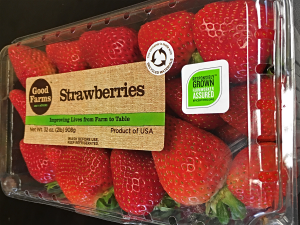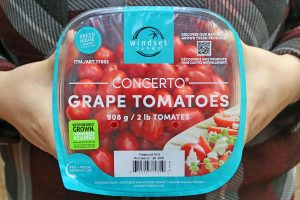74% Consider Environmental or Social Well-Being Concerns When Making Purchases
 According to the Hartman Group’s Sustainability 2017 report, 74% of consumers consider environmental or social well-being concerns when making purchases, and 87% of core consumers (those most intensely engaged in sustainability) avoid buying products from companies with poor labor practices.
According to the Hartman Group’s Sustainability 2017 report, 74% of consumers consider environmental or social well-being concerns when making purchases, and 87% of core consumers (those most intensely engaged in sustainability) avoid buying products from companies with poor labor practices.
Consumers want to know how to match their food dollars with their values, but also report having trouble identifying which companies deserve to be acknowledged for their sustainability efforts. Without a clear way to communicate their investments in social or environmental sustainability, produce companies can be at risk of missing out on getting credit for their good work. Further, for many retailers, thoroughly vetting the supply chain in order to provide consumers assurance regarding the sustainability of products on the shelf is difficult.
According to Hartman, “Consumers want to see corporate responsibility efforts that show an authentic commitment to ethical action, especially on-pack.” Social certification can provide external validation for the good a company does, and clear labeling can offer a solution to the breakdown in communication that happens between retailers, producers, and consumers at the store.
EFI certification is increasingly being either favored or required by buyers who are interested in supply-chain integrity. Thus, certification can open up market doors for EFI-certified farms.”
– Christy Getz, Researcher, UC Cooperative Extension
Equitable Food Initiative (EFI) certification and the EFI Responsibly Grown, Farmworker Assured® label are tools to communicate the trust and assurance sought by sustainably minded consumers. The benefits to certification flow up and down the supply chain, from grower to retailer to consumer. Kevin Doran, CEO of Houweling’s Tomatoes, says that he appreciates having the good things his company is doing validated by a third-party auditor through the EFI certification process.
That type of validation opens doors for growers that are doing the right thing by their workers, says Christy Getz, Associate Cooperative Extension Specialist at University of California, Berkeley. “EFI certification is increasingly being either favored or required by buyers who are interested in supply-chain integrity. Thus, certification can open up market doors for EFI-certified farms.”
 Consumers buying products that carry the EFI label have the added benefit of knowing the produce meets the highest food safety standards.
Consumers buying products that carry the EFI label have the added benefit of knowing the produce meets the highest food safety standards.
Candy Quintero, Human Resources for Andrew & Williamson Fresh Produce, which has 12 EFI-certified operations, explains, “The EFI certification means a workplace free from discrimination, child labor, forced labor and retaliation. It means that farmworkers are happy harvesting for that company and that the grower fulfilled a broad criteria of standards. I know that EFI-certified products are of the highest quality in food safety and social responsibility.”
Hartman’s sustainability report says the currency of trust for sustainably minded consumers is quickly becoming openness and honesty. EFI creates more transparency in the supply chain, and by clearly marking the products from companies that adhere to EFI Standards in labor practices, food safety and pest management, consumers are able to vote for more socially sustainable products with their food dollars.
To learn more about EFI certification and the standards behind the Responsibly Grown, Farmworker Assured™ label, visit equitablefood.org.

